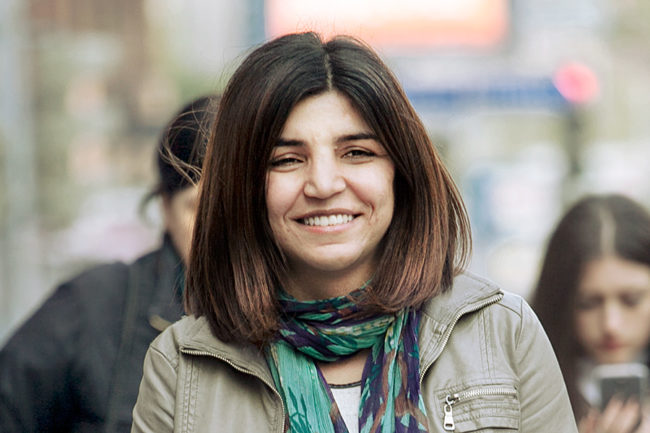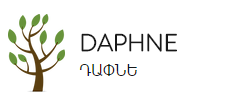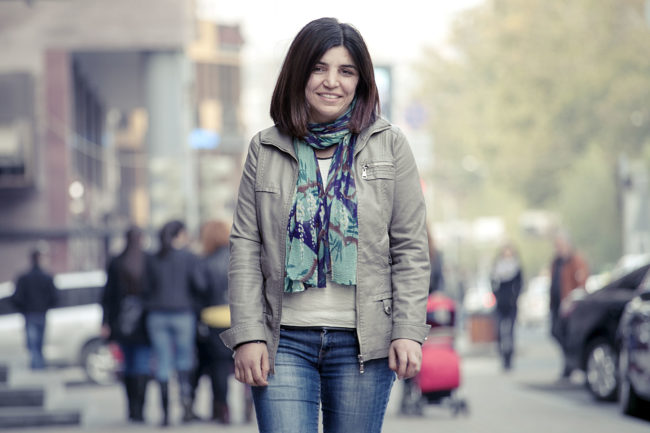
 There is a dead silence in the women’s shelter.
There is a dead silence in the women’s shelter.
Women survivors of domestic abuse are looking at Mariam, 27, in an attempt to catch her every word and every expression. Mariam speaks in a low voice, but with confidence.
‘Never look back, never tolerate violence, and always go forward… Life is a struggle and you have to fight.’
Mariam Gevorgyan’s words have changed the lives of many women, freeing them from the grip of violence and opening new doors for the future.
Mariam has been working as an assistant social worker at the Women’s Support Centre refuge for five years. She helps victims of violence throughout their recovery, organises workshops on women’s rights, and shares her experience with them.
‘I always tell women to move on, not to give in to despair, since there is always a way out of any situation. Women who have fallen victim to abuse should know that “failure” is no alternative. True, it’s very difficult in the beginning, but you have to fight to get what you want’, says Mariam.
‘I’ve been a fighter from early childhood’
Mariam learned hairdressing at the age of 16 and began to earn a living. The urge to fight against injustice and support equal rights has always prompted her to go forward.
‘I’ve been a fighter from early childhood, always questioning the fact that men were allowed to do things that were forbidden for women. In our family things were completely different. I have three sisters: my parents raised us all without strict prohibitions and never banned us from doing anything just because we were girls. Our family was free of such traditional stereotypical attitudes’, she added.
It is hard to imagine that Mariam, a brave, confident woman full of life who now advocates for women's rights, has gone through nine circles of hell, falling victim to brutal abuse seven years ago. Domestic violence has left its marks all over her body and face.
‘When that happened to me, I was simply shocked. I could not believe someone could treat me that way’, says Mariam.
‘They kept telling me I was worthless’
Seven years ago, at the age of 20, Mariam got married, moving to Saint Petersburg in Russia from her home village of Taperakan, in Ararat Province. Over the nine months of her marriage, she suffered brutal beatings and severe torture at the hands of her husband and mother-in-law. There are scars from fork marks and iron burns on various parts of her body.
‘They kept telling me I was worthless, that I was nothing, that I was made to become their slave, or that they would kill my parents or harm them in another way, and I believed them. This is the greatest weapon of all abusive people. They tend to lower women’s self-esteem and keep them in constant fear’, says Mariam, who was locked up throughout the nine months of her marriage.
On top of brutal physical abuse, Mariam was not allowed to work, and lived in an atmosphere of constant threats and intimidation.
‘My mother-in-law used to burn my skin with a lighter’
Her husband and mother-in-law would pick at any minor issue, from ‘not cleaning the house fast enough’, failing to ‘serve a dish beautifully’ or ‘slamming the door’ to start beating her, leaving her with a black eye and a body covered in bruises.
‘Every time they would find fault with me to start the beatings. My mother-in-law used to burn my skin with a lighter, and then she began burning my chest with balls of paper. She forced me to open my mouth so that she could burn my tongue with a lighter and when I closed my mouth, unable to stand the pain, she would hit me on the head with a rolling pin. She pulled my hair so hard that sometimes the skin on my head peeled off. All this was done to make me open my mouth again and let her burn my tongue.’
‘When she burnt it, she would put a bar of soap in my mouth, so that I knew “what real torment” felt like. As if that wasn’t enough, she would shut my mouth with her hands to make me swallow the soap…’ recalls Mariam.
She was allowed to sleep in a bed with her husband only during the first two weeks of her marriage. After that she was forced to stand in a corner all night, but that caused leg swelling, so they put a chair in the room and she slept sitting for months.
Mariam was only allowed to shower with cold water and do laundry by hand. She had two minutes to finish washing the clothes; otherwise, she would be beaten up again. Whenever she failed to wash off bloodstains from her clothes fast enough, they resumed beating her.
‘Only God knows what would have happened to me’

‘Nine months later, I ran away from that house. That day, the door was left open by accident and everyone had left the house. When I saw the door open, I was so happy that I simply bounced out of the house, not even thinking about where I was running.’
‘I struggled to go home, to return to my parents. I made up my mind to obtain justice as soon as I managed to return home, so that they received justly deserved punishment for their actions. If it were not for my escape, only God knows what would have happened to me’, says Mariam.
After her escape, Mariam finally arrived in Armenia where she contacted the police, and an investigation was subsequently opened based on her testimony. The torture and beatings had changed her to such an extent that her own parents barely recognised her when she arrived at the airport.
In Armenia, Mariam received psychological, social, and legal assistance from the Women’s Support Centre, and went through various stages of rehabilitation.
‘I have never trusted the police. In the beginning they seemed to empathise with me and were shocked at what had happened, but then they decided to reduce the sentence. They have yet to pay me compensation’, says Mariam.
According to the court’s ruling, Haykanush Mikaelyan, Mariam’s mother-in-law who repeatedly abused and tortured her, was sentenced to four years in prison, but due to a general amnesty, Mikaelyan was released from jail several months later. Mariam’s husband, Davit Ziroyan, was not imprisoned at all.
‘Society does not consider a slap on the face to be abuse’
Mariam argues that police and other law enforcement agencies should undergo special training before dealing with cases of domestic violence.
‘It’s necessary to educate both the police and medical personnel, but all this cannot be done solely by non-governmental organisations. This should be carried out on the state level. If they adopted a law against domestic violence, raised awareness among women of their rights, provided retraining for specialists, and such incidents did not go unreported, we would be able to achieve progress: there would be a decline in the level of violence. Today, however, our society does not consider a slap on the face or psychological pressure to be abuse. They consider it to be violence only when a woman is killed’, says Mariam.
Public attitudes and stereotypes have forced her to become a spokesperson for women's rights. Today, she not only offers assistance to victims of abuse, but also strives to change public perceptions of the problem.
‘You have the right to live freely and happily’
As part of her work, in the Women’s Support Centre’s shelter, Mariam teaches women to live independently. Alongside this, Mariam continues to work as a hairdresser. She has also studied at Erebuni College and was trained to work as an assistant nurse. She says much has changed in the last five years.
‘I’ve always had that stubborn streak, but I’ve changed a lot. I’ve become more striving, more prepared for life and self-reliant’, says Mariam, who plans to obtain a higher education in near future.
She underlines that no one is safe from violence, since this is something that can happens to anyone, regardless of social background, age, or gender.
‘What’s most important is to find a way out of that situation, not to endure violence and to realise that you have the right to live freely and happily’, says Mariam.
The article is a partner post written by Lilit Arakelyan. The original version first appeared on Daphne, on 28 April 2017.




 4 October 2017
4 October 2017



